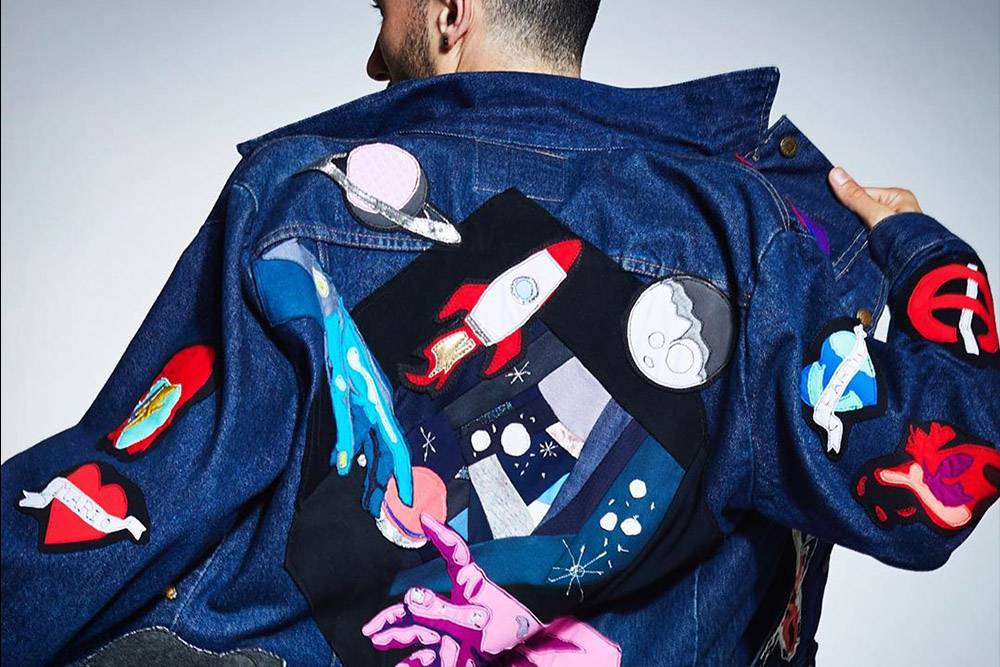
Zero Waste Daniel is a sustainable, eco-friendly, and handmade in Brooklyn fashion brand by Daniel Silverstein, a zero-waste lifestyle pioneer, and clothing designer.
He creates genderless clothing and accessories with pre-consumer waste sourced from New York City’s garment industry, as well as other hard-to-recycle materials.
His New York City atelier is filled with endless bins of fabric scraps, discarded fabric that other designers, costume departments, fashion studios, and garment factories would normally send to landfills. Instead, he creates stylish and unique pieces of upcycled fashion.
Upcycling clothes is one of the best ways to drive more sustainability in the global fashion industry. It's the process of designing and producing new clothes from used garments and other textiles. It has many environmental benefits such as less waste, pollution, water, and energy savings.
The textile and apparel industry is one of the largest polluters globally. The overproduction and overconsumption of cheaply made clothing cause a lot of harm to the planet, the people, and animals living on it.
The way we produce, consume, and discard clothes today has catastrophic social and environmental consequences.
The United States alone generates 16.9 million tons of used textiles every year, according to the Environmental Protection Agency (EPA). That number has doubled over the last 20 years and is 10 times bigger than in 1960.
The Global Fashion Agenda's Pulse of The Fashion Industry reports that fashion is responsible for 92 million tons of global waste every year. It accounts for 4 percent of the world’s entire waste.
Fashion used to be slow and expensive before the industrial revolution. Fashion houses used to create new collections 2 to 4 times per year. Today, large fast-fashion retailers design, produce and distribute thousands of new styles every week.
Companies like Zara make more than 1 million garments every day. In the fast fashion industry, it's also very common to produce more than what can be sold. Most excess clothing ends up in landfills to decompose or be incinerated.
The Ellen MacArthur Foundation reports that less than 1% of all textile waste is recycled to make new clothing. One of the biggest problems in the fashion industry is that too many clothes are being produced.
It's time for fashion brands to adopt more sustainable practices in their daily operations. Brands and retailers worldwide need to move towards sustainable production.
Luckily, the sustainable fashion movement has grown in recent years. Many fashion businesses now have several sustainability initiatives in place and goals from the coming years.
Conscious consumerism is rising, particularly among Millenials and Generation Z. Consumers are asking for more sustainability, transparency, and accountability.
The latest CGS Retail Survey indicates that 30% of consumers in the United States and the United Kingdom would stop using a brand completely if it didn't use sustainable and ethical practices, and more than 30% would purchase less frequently.
Sustainable, zero-waste, animal-free, fair and ethically produced clothing is the future of the fashion industry and on the checklist of mindful consumers.
To build trust and keep customers, suppliers, and partners, fashion brands and retailers now need to work for the integration of more ecological, social, and economic sustainability practices.
Daniel Silverstein with his brand Zero Waste Daniel is pioneering circular fashion through upcycling, a more inclusive and regenerative way of producing clothes.
He tells Green Matters over the phone that sustainability wasn't as popular when he was studying design at the Fashion Institute of Technology (FIT) as it is today.
“When I was a student, sustainability was a club you could join. It certainly wasn’t anything you could major or minor in. It really didn’t surpass more than the organic cotton, natural dye conversation. [...] It was challenging to get people interested in that aspect of the designs. People mostly wanted to just talk about what they looked like."
- Daniel Silverstein, Zero Waste Daniel founder, and Creative Director
He originally wanted to talk about sustainability in the fashion industry, next to other mainstream designers such as Stella McCartney. He says:
“My freshman year at FIT, one of my teachers said there are good designers and there are great designers. Good designers have careers and see their stuff in stores, and great designers change the way people dress.”
He launched Zero Waste Daniel after a positive response on Instagram when he shared a new shirt he made out of a collection of small black fabric scraps.
"I took the afternoon and made myself a shirt and put it on my Instagram. I had maybe 2,000 followers, and probably the most likes I had ever gotten was 95. I posted this dumb selfie of a shirt I’d made out of my own trash because I was too poor to go shopping, and it instantly got 200 likes. It was the most popular thing I’d ever done.”
He now works out of a 750-square-foot storefront a few blocks east of the Brooklyn-Queens Expressway, down a mostly residential side street in Williamsburg.

Zero Waste Daniel isn't the only brand using upcycling to promote sustainable fashion. A lot of people are getting more interested in upcycling clothing and sustainability as a whole. Talking about sustainability in fashion, Daniel Silverstein says:
“I love that the trend has grown. And I love my relationship to that trend growing. We hear that sustainability is a trend, but sustainability means something so much deeper than what a style looks like. It actually means being able to maintain what we’re doing at a specific rate or level. And we’re actually seeing in this moment a shift in the rate at which stuff is being manufactured. To see this trend growing, it actually means that people are not just copying the style of it, but the manufacturing of it - then we’re making measurable change, and that’s very exciting to me.”
As more people make the conscious choice of buying and wearing sustainable, ethical, and second-hand clothes, it's time for large fashion brands and retailers to change and do better.
Photos via Zero Waste Daniel.
Was this article helpful to you? Please tell us what you liked or didn't like in the comments below.
About the Author: Alex Assoune
What We're Up Against
Multinational corporations overproducing cheap products in the poorest countries.
Huge factories with sweatshop-like conditions underpaying workers.
Media conglomerates promoting unethical, unsustainable products.
Bad actors encouraging overconsumption through oblivious behavior.
- - - -
Thankfully, we've got our supporters, including you.
Panaprium is funded by readers like you who want to join us in our mission to make the world entirely sustainable.
If you can, please support us on a monthly basis. It takes less than a minute to set up, and you will be making a big impact every single month. Thank you.
































0 comments